外研版 必修四 Module 3 Body Language and Non-verbal Communication Reading课件 (46张PPT)
文档属性
| 名称 | 外研版 必修四 Module 3 Body Language and Non-verbal Communication Reading课件 (46张PPT) |

|
|
| 格式 | pptx | ||
| 文件大小 | 9.3MB | ||
| 资源类型 | 教案 | ||
| 版本资源 | 外研版 | ||
| 科目 | 英语 | ||
| 更新时间 | 2022-10-19 00:00:00 | ||
图片预览

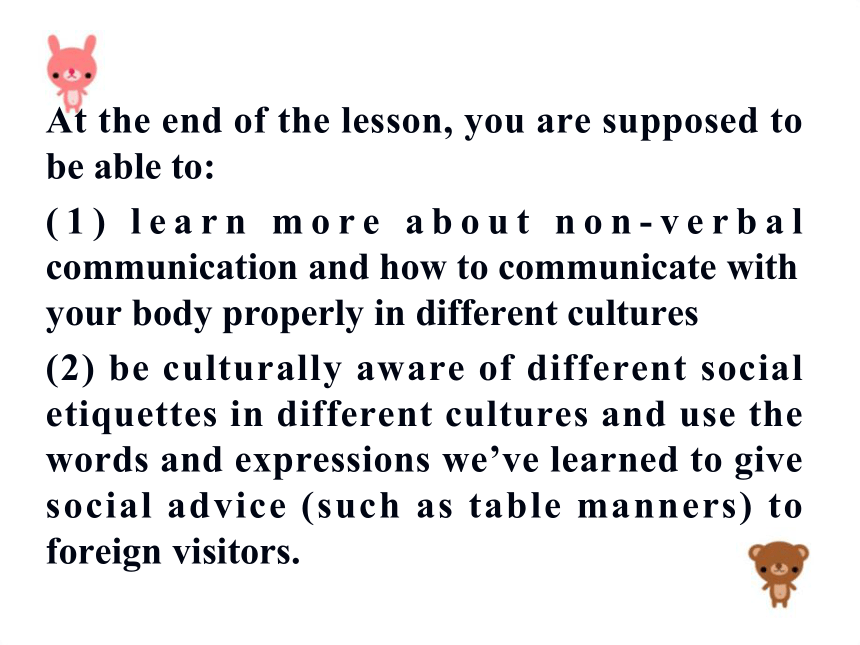
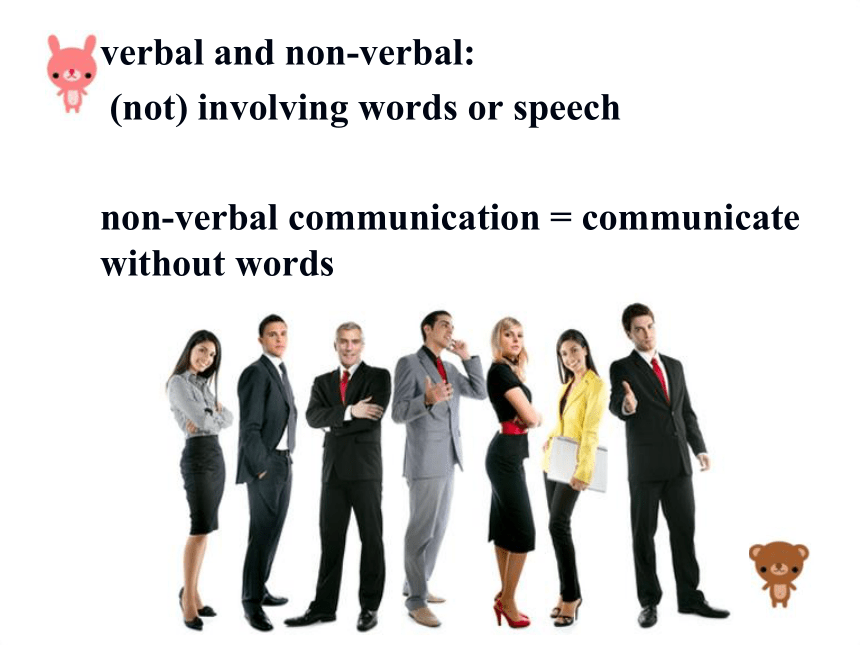
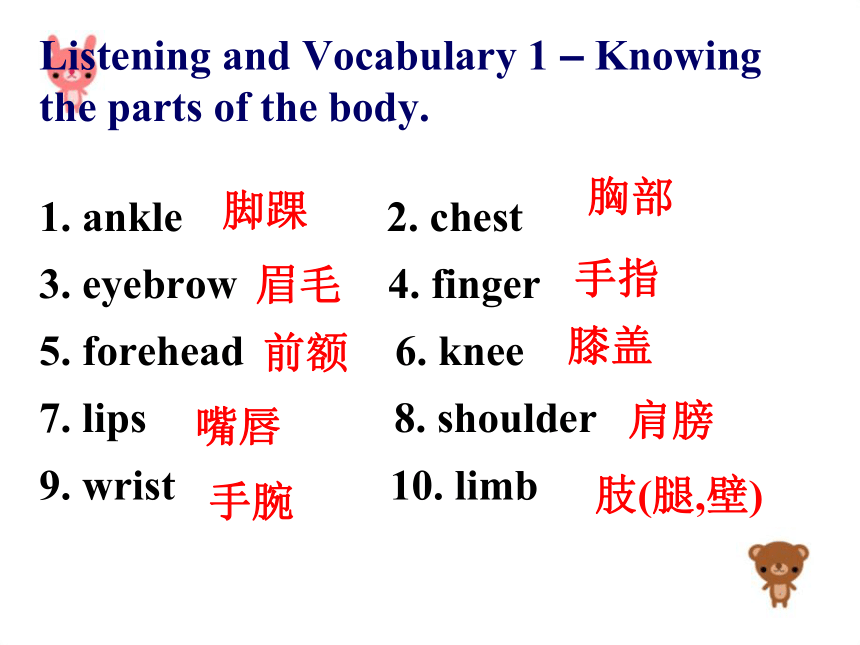
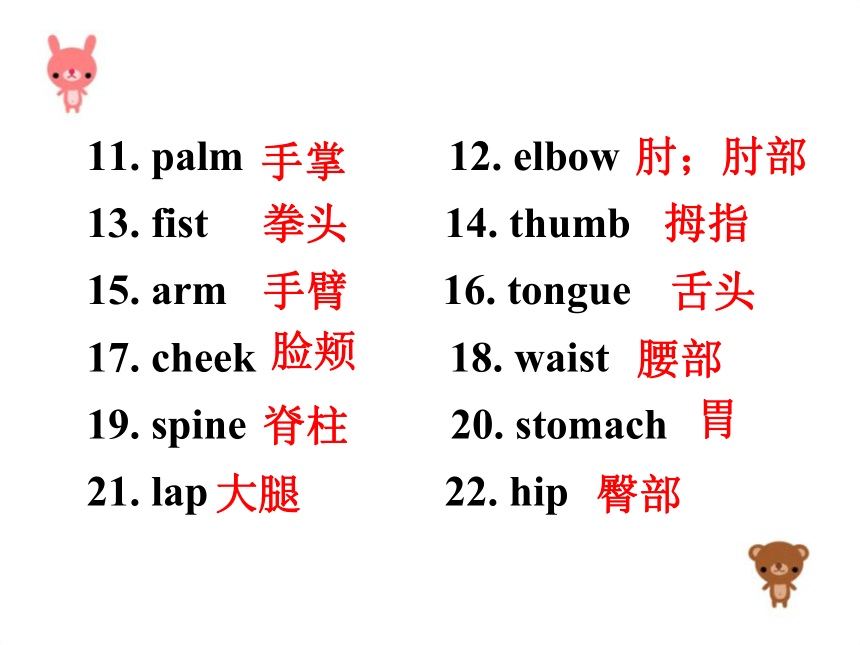
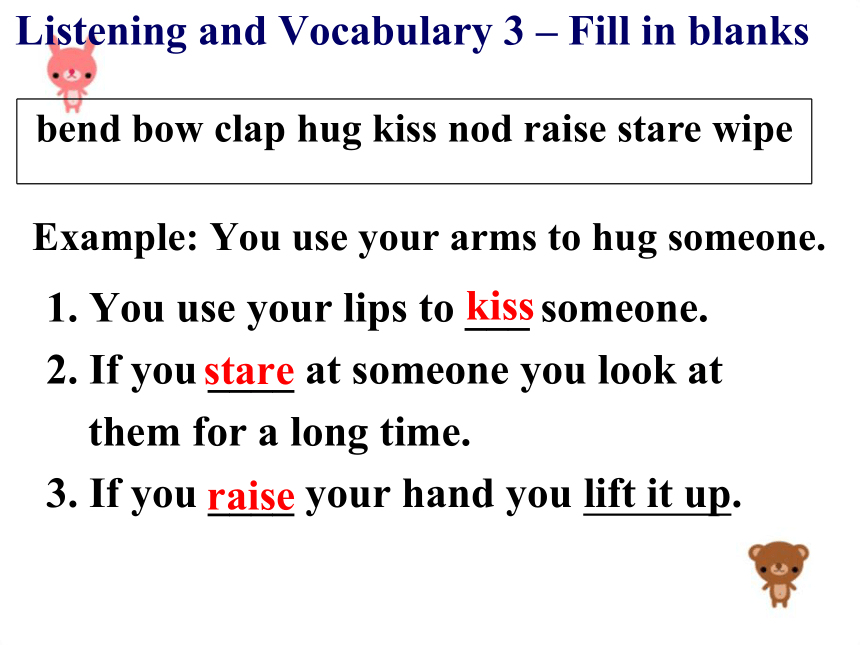
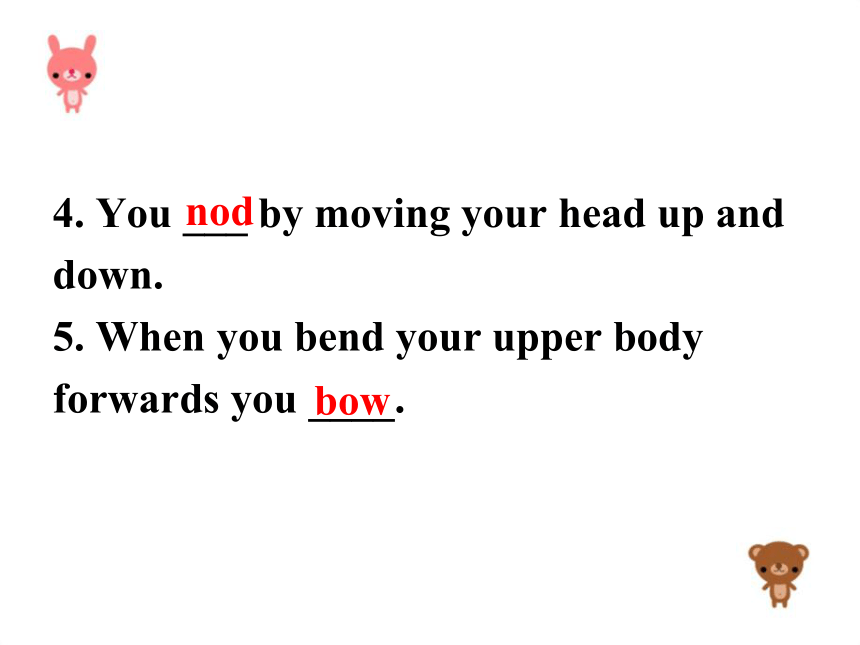
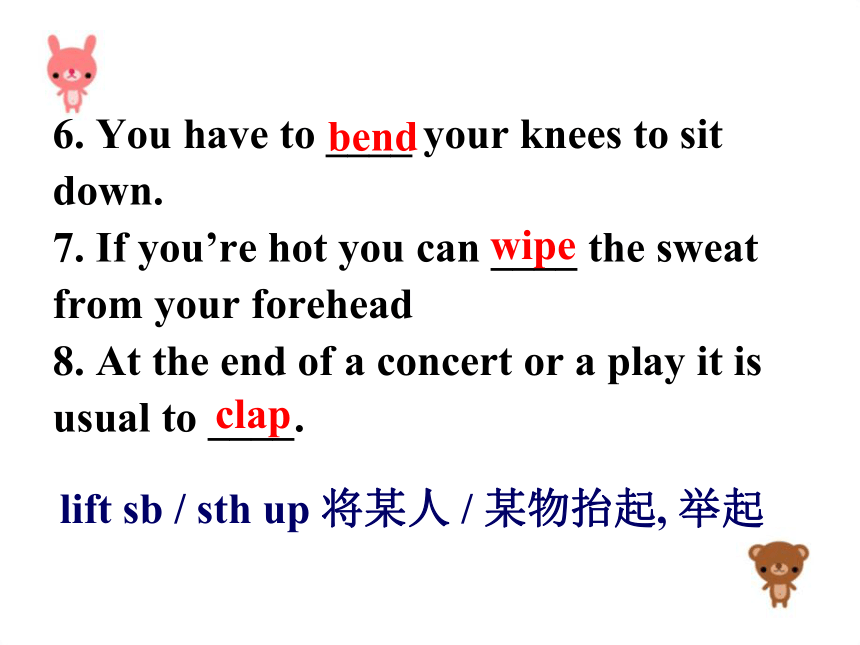
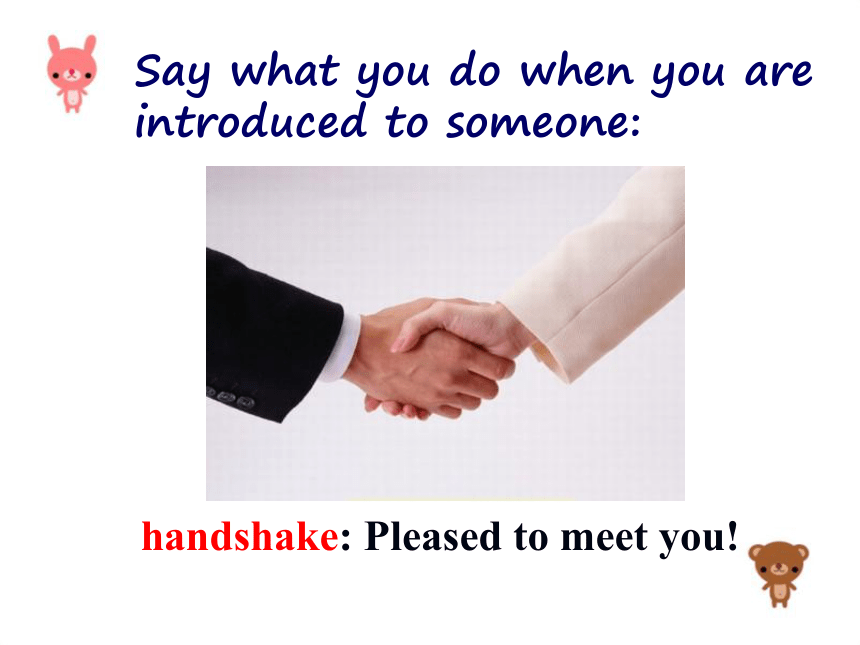
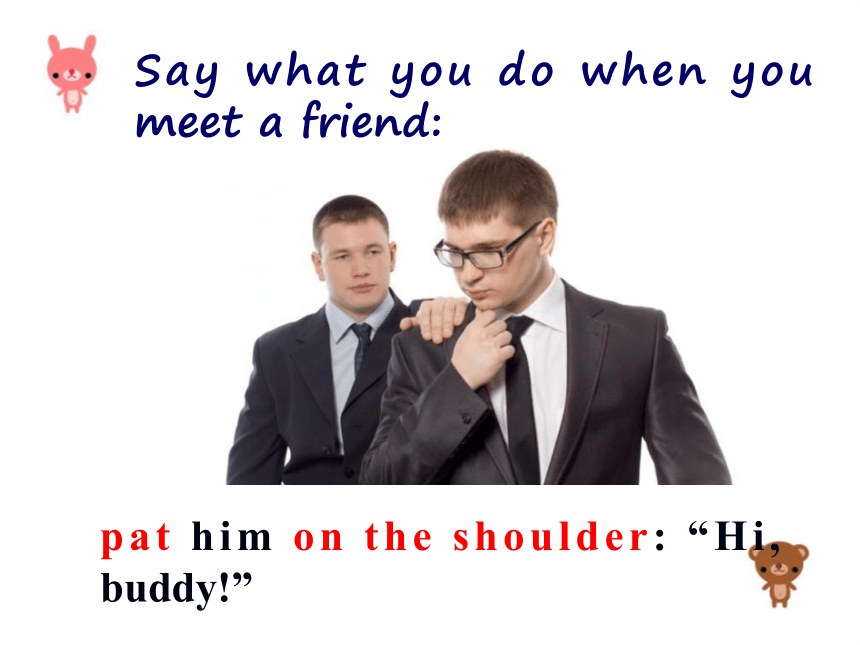
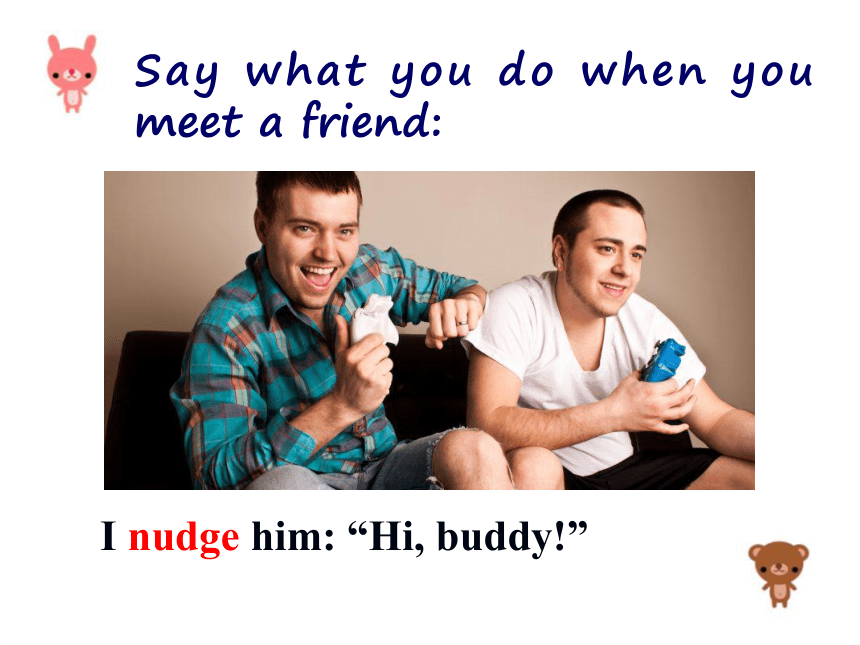
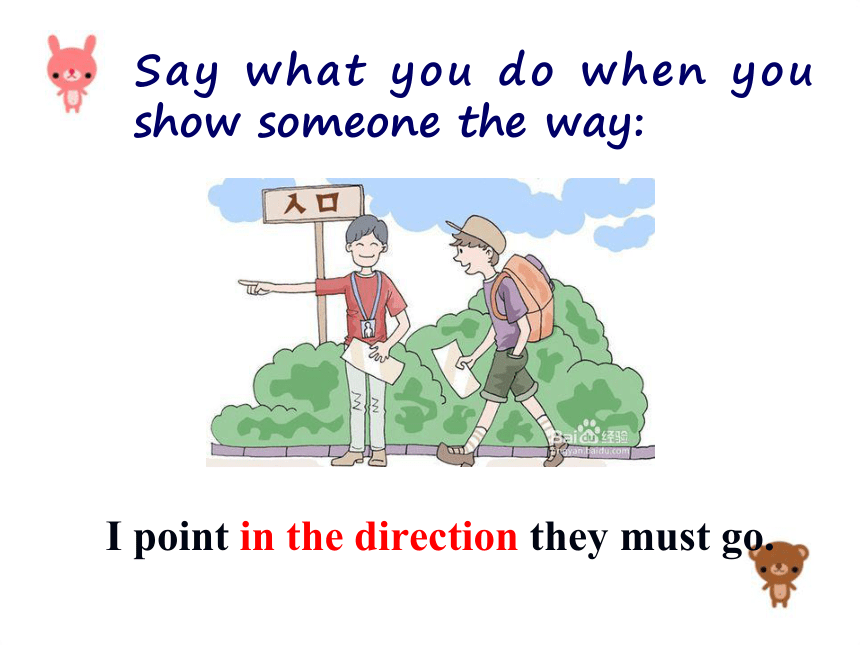
文档简介
(共46张PPT)
Module 3
Body Languague and
Non-Verbal comunications
Introduction & Reading
At the end of the lesson, you are supposed to be able to:
(1) learn more about non-verbal communication and how to communicate with your body properly in different cultures
(2) be culturally aware of different social etiquettes in different cultures and use the words and expressions we’ve learned to give social advice (such as table manners) to foreign visitors.
verbal and non-verbal:
(not) involving words or speech
non-verbal communication = communicate without words
Listening and Vocabulary 1 – Knowing the parts of the body.
1. ankle 2. chest
3. eyebrow 4. finger
5. forehead 6. knee
7. lips 8. shoulder
9. wrist 10. limb
脚踝
胸部
眉毛
手指
前额
嘴唇
手腕
膝盖
肩膀
肢(腿,壁)
11. palm 12. elbow
13. fist 14. thumb
15. arm 16. tongue
17. cheek 18. waist
19. spine 20. stomach
21. lap 22. hip
手掌
肘;肘部
拳头
拇指
手臂
舌头
脸颊
腰部
脊柱
胃
大腿
臀部
bend bow clap hug kiss nod raise stare wipe
Example: You use your arms to hug someone.
1. You use your lips to ___ someone.
2. If you ____ at someone you look at them for a long time.
3. If you ____ your hand you lift it up.
kiss
stare
raise
Listening and Vocabulary 3 – Fill in blanks
4. You ___ by moving your head up and
down.
5. When you bend your upper body
forwards you ____.
nod
bow
6. You have to ____ your knees to sit
down.
7. If you’re hot you can ____ the sweat
from your forehead
8. At the end of a concert or a play it is
usual to ____.
bend
wipe
clap
lift sb / sth up 将某人 / 某物抬起, 举起
Say what you do when you are introduced to someone:
handshake: Pleased to meet you!
Say what you do when you meet a friend:
pat him on the shoulder: “Hi, buddy!”
Say what you do when you meet a friend:
I nudge him: “Hi, buddy!”
Say what you do when you show someone the way:
I point in the direction they must go.
Say what you do when you see a friend in the distance:
I wave my hand
Say what you do when you enter a friend’s house:
I knock at the door and say: “Knock! Knock! Could I come in ”
Say what you do when you say yes:
I nod my head up and down
Say what you do when you say no:
I shake my head from side to side
Say what you do when you say who me :
I point to myself and put on a surprised expression
Say what you do when you say goodbye:
I wave goodbye
shrug and spread hands: I don’t know
so what
beckon
Thumb up : Wonderful! Good job!
give sb a like/ thumb-up
frown: facing with difficulties
pull a long face: unhappy/deep in thought
hang one’s head: frustrated/ shamed
embrace/ cuddle/ hug: love
cross one’s legs
relaxed
fold one’s arms
on guard
guard
1.vt. guard the entrance
There is no one to guard these isolated farms against attack.
2. n. (1)[C] bodyguard
(2) [U] When you go to a strange place, be on guard.
We should be on guard to make sure the students are safe.
point to someone: blame
cover one’s face: shamed/ sad
lean toward someone
close relationship
look left
look right
make up
recall
People give away much more by their gestures than by their words.
In those days, he used to give _____
a part of his income to help his friend.
2. Both sides argued with reason, and
neither would give _____.
3. If they are burned, they give _____
poisonous gases.
4. When they made ready to climb the
next ridge (山脊), they found that their
oxygen had given ______.
Exercises
away
in
off
out
5. Both the man and horse gave _____ after the long ride.
6. All hope of finding the missing aircraft was given _____ and the search stopped.
7. Mary had to give _____ her job after her marriage.
out
up
up
1. n. (1) a movement of part of your body, especially your hands or head, to show what you mean or how you feel
手势,姿势
(2) sth you say or do to show how you feel
姿态,表示
They think it would be a nice gesture to send her a card.
2. vi. gesture for sb to do sth: He gestured for her to take a seat.
read: read-read-read
(1) You can’t believe everything you read in the papers./ read between the lines
(2) She shook her head, and I read this as a refusal./ read one’s mind/ read sb like a book
(3) A sign on the door reads: “No Entry”. The thermometer read 39 degrees.
(4) I read history at Cambridge.
Watch a video “Lie to me” and learn about how to read unconscious micro-expressions:
conscious: be conscious of/that=be aware of/that
I’m conscious of my mistake. = I’m conscious that I’ve made a mistake.
n. consciousness 辨析:conscience
He was lying unconscious on the ground.
n. (1) From his position, he had a good view of the sea. Is everyone in position
(2) Keep the box in an upright position.
(3) He was then given an important position in the government of a state.
(4) What would you do in my position I’m not in a position to help you.
2. vt. Large screens were positioned at either end of the stadium.
1. vi.变化 “What time do you start work ” “It varies.”
(1)The climate in China varies from region to region. The depth of the water varies from 10 meters to 50 meters.
(2) The students’ work varies considerably in quality.
(3) The menu varies with the season.
2. vt. The job enables me to vary my working hours.
Word family:
adj. varied/ n. variation:
You should have a varied diet to keep healthy. The website has rich and varied content.
I can’t adapt to the variations in temperature here.
adj. various/ n. variety:
He has various books.=He has a variety of books.
shake- shook- shaken:
1. vt./ vi. The whole house shakes when a train goes past.
Shake the bottle well before use.
Do people in Italy shake hands when they meet
He was shaking with fear.
What had happened shook his faith in her.
2. n. She gave him a shake to wake him. handshake/ milkshake
threat-threaten fright-frighten
(1)He is unlikely to be a threat to the Chinese player in the final.
(2)
他用刀威胁这些学生。
He threatened these pupils with a knife.
他要挟说要每小时杀一个乘客,如果他们的要求没有得到满足。
He threatened to kill one passenger every hour if their demands were not met.
1. vi. deal with=handle ;
deal in - dealer
2. n. (1) make a deal/ That’s a deal.
(2)a great deal of + ?
Greetings in Asian countries do not
involve touching the other person, but
they always involve the hands.
involve 涉及,包括
eg:
这个项目涉及到很多工作。
This project involves a lot of work.
I’m involved in a lot of extra work.
One person holds up his hand, palm outwards and five fingers spread.
spread-spread-spread
(消息、疾病)传播;伸展
He spread his arms to welcome me.
The news of victory spread quickly.
The government took measures to prevent the spread of the disease.
One person holds up his hand, palm outwards and five fingers spread.
独立主格结构:有自己单独的主语,其他符合with复合结构的用法
The meeting over, we all went home.
He came in, book under his arm.
The test ______(finish), we began our holiday.
The boy ________(help) us, we eventually found our way.
Some food _________ (buy), he went out.
finished
helping
to buy
Module 3
Body Languague and
Non-Verbal comunications
Introduction & Reading
At the end of the lesson, you are supposed to be able to:
(1) learn more about non-verbal communication and how to communicate with your body properly in different cultures
(2) be culturally aware of different social etiquettes in different cultures and use the words and expressions we’ve learned to give social advice (such as table manners) to foreign visitors.
verbal and non-verbal:
(not) involving words or speech
non-verbal communication = communicate without words
Listening and Vocabulary 1 – Knowing the parts of the body.
1. ankle 2. chest
3. eyebrow 4. finger
5. forehead 6. knee
7. lips 8. shoulder
9. wrist 10. limb
脚踝
胸部
眉毛
手指
前额
嘴唇
手腕
膝盖
肩膀
肢(腿,壁)
11. palm 12. elbow
13. fist 14. thumb
15. arm 16. tongue
17. cheek 18. waist
19. spine 20. stomach
21. lap 22. hip
手掌
肘;肘部
拳头
拇指
手臂
舌头
脸颊
腰部
脊柱
胃
大腿
臀部
bend bow clap hug kiss nod raise stare wipe
Example: You use your arms to hug someone.
1. You use your lips to ___ someone.
2. If you ____ at someone you look at them for a long time.
3. If you ____ your hand you lift it up.
kiss
stare
raise
Listening and Vocabulary 3 – Fill in blanks
4. You ___ by moving your head up and
down.
5. When you bend your upper body
forwards you ____.
nod
bow
6. You have to ____ your knees to sit
down.
7. If you’re hot you can ____ the sweat
from your forehead
8. At the end of a concert or a play it is
usual to ____.
bend
wipe
clap
lift sb / sth up 将某人 / 某物抬起, 举起
Say what you do when you are introduced to someone:
handshake: Pleased to meet you!
Say what you do when you meet a friend:
pat him on the shoulder: “Hi, buddy!”
Say what you do when you meet a friend:
I nudge him: “Hi, buddy!”
Say what you do when you show someone the way:
I point in the direction they must go.
Say what you do when you see a friend in the distance:
I wave my hand
Say what you do when you enter a friend’s house:
I knock at the door and say: “Knock! Knock! Could I come in ”
Say what you do when you say yes:
I nod my head up and down
Say what you do when you say no:
I shake my head from side to side
Say what you do when you say who me :
I point to myself and put on a surprised expression
Say what you do when you say goodbye:
I wave goodbye
shrug and spread hands: I don’t know
so what
beckon
Thumb up : Wonderful! Good job!
give sb a like/ thumb-up
frown: facing with difficulties
pull a long face: unhappy/deep in thought
hang one’s head: frustrated/ shamed
embrace/ cuddle/ hug: love
cross one’s legs
relaxed
fold one’s arms
on guard
guard
1.vt. guard the entrance
There is no one to guard these isolated farms against attack.
2. n. (1)[C] bodyguard
(2) [U] When you go to a strange place, be on guard.
We should be on guard to make sure the students are safe.
point to someone: blame
cover one’s face: shamed/ sad
lean toward someone
close relationship
look left
look right
make up
recall
People give away much more by their gestures than by their words.
In those days, he used to give _____
a part of his income to help his friend.
2. Both sides argued with reason, and
neither would give _____.
3. If they are burned, they give _____
poisonous gases.
4. When they made ready to climb the
next ridge (山脊), they found that their
oxygen had given ______.
Exercises
away
in
off
out
5. Both the man and horse gave _____ after the long ride.
6. All hope of finding the missing aircraft was given _____ and the search stopped.
7. Mary had to give _____ her job after her marriage.
out
up
up
1. n. (1) a movement of part of your body, especially your hands or head, to show what you mean or how you feel
手势,姿势
(2) sth you say or do to show how you feel
姿态,表示
They think it would be a nice gesture to send her a card.
2. vi. gesture for sb to do sth: He gestured for her to take a seat.
read: read-read-read
(1) You can’t believe everything you read in the papers./ read between the lines
(2) She shook her head, and I read this as a refusal./ read one’s mind/ read sb like a book
(3) A sign on the door reads: “No Entry”. The thermometer read 39 degrees.
(4) I read history at Cambridge.
Watch a video “Lie to me” and learn about how to read unconscious micro-expressions:
conscious: be conscious of/that=be aware of/that
I’m conscious of my mistake. = I’m conscious that I’ve made a mistake.
n. consciousness 辨析:conscience
He was lying unconscious on the ground.
n. (1) From his position, he had a good view of the sea. Is everyone in position
(2) Keep the box in an upright position.
(3) He was then given an important position in the government of a state.
(4) What would you do in my position I’m not in a position to help you.
2. vt. Large screens were positioned at either end of the stadium.
1. vi.变化 “What time do you start work ” “It varies.”
(1)The climate in China varies from region to region. The depth of the water varies from 10 meters to 50 meters.
(2) The students’ work varies considerably in quality.
(3) The menu varies with the season.
2. vt. The job enables me to vary my working hours.
Word family:
adj. varied/ n. variation:
You should have a varied diet to keep healthy. The website has rich and varied content.
I can’t adapt to the variations in temperature here.
adj. various/ n. variety:
He has various books.=He has a variety of books.
shake- shook- shaken:
1. vt./ vi. The whole house shakes when a train goes past.
Shake the bottle well before use.
Do people in Italy shake hands when they meet
He was shaking with fear.
What had happened shook his faith in her.
2. n. She gave him a shake to wake him. handshake/ milkshake
threat-threaten fright-frighten
(1)He is unlikely to be a threat to the Chinese player in the final.
(2)
他用刀威胁这些学生。
He threatened these pupils with a knife.
他要挟说要每小时杀一个乘客,如果他们的要求没有得到满足。
He threatened to kill one passenger every hour if their demands were not met.
1. vi. deal with=handle ;
deal in - dealer
2. n. (1) make a deal/ That’s a deal.
(2)a great deal of + ?
Greetings in Asian countries do not
involve touching the other person, but
they always involve the hands.
involve 涉及,包括
eg:
这个项目涉及到很多工作。
This project involves a lot of work.
I’m involved in a lot of extra work.
One person holds up his hand, palm outwards and five fingers spread.
spread-spread-spread
(消息、疾病)传播;伸展
He spread his arms to welcome me.
The news of victory spread quickly.
The government took measures to prevent the spread of the disease.
One person holds up his hand, palm outwards and five fingers spread.
独立主格结构:有自己单独的主语,其他符合with复合结构的用法
The meeting over, we all went home.
He came in, book under his arm.
The test ______(finish), we began our holiday.
The boy ________(help) us, we eventually found our way.
Some food _________ (buy), he went out.
finished
helping
to buy
